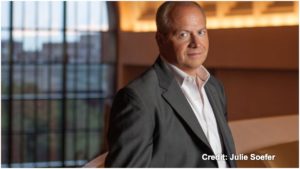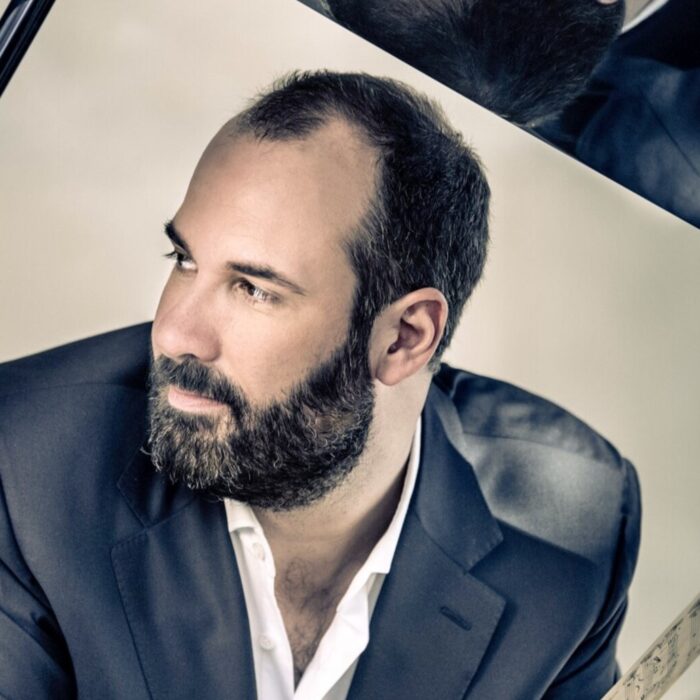
Q & A: Houston Grand Opera’s Artistic and Music Director Patrick Summers on His New Book
By Greg WaxbergReaders looking for a thought-provoking, feel-good book about the powers of arts education and music’s spiritual force: look no further than “The Spirit of This Place: How Music Illuminates the Human Spirit (The University of Chicago Press).”
Written by Houston Grand Opera Artistic and Music Director Patrick Summers, a self-professed lover of writing, the book is a collection of 36 essays inspired by the city where he lives and works, and it resulted from a university lecture.
Nicolas Shumway, Dean of the Rice University School of Humanities, invited Maestro Summers to address the faculty and student body in 2013 for the School of Humanities’ annual Campbell Lecture Series (named after the late T.C. Campbell of Austin). This prestigious event brings a distinguished humanities scholar to campus to speak on a topic of broad humanistic interest—three presentations over three consecutive nights.
Plus, through a special arrangement with The University of Chicago Press, speakers are encouraged to write a book based on the lectures.
“Two items led me to invite Patrick Summers to participate in the series,” Shumway stated. “I have been an opera lover for many years and a particular fan of Houston Grand Opera, where I developed great admiration for Mr. Summers as a conductor. But I also noticed that the program notes published under his name were particularly informative and well-written. Given his prestige as an internationally recognized opera conductor and his apparent gifts as a writer, he seemed an obvious candidate for becoming a Campbell lecturer.”
With the book now published, Maestro Summers spoke to OperaWire about its impact on him and its potential impact on the audience.
OperaWire: Because part of the book is a transcript of your lecture series, what is the rest? Would you have written the book without having given the lectures?
Patrick Summers: “The Spirit of This Place” is filled with ideas that have percolated throughout my life. It is a transcript of only the third of the three lectures, and I would likely have written it in a different form had I not been asked to give the lectures.
OW: The book reads as though it were a cathartic writing experience. Was it?
PS: Writing is always a cathartic experience for me, and I have found that the more writing I do, the more connected to music I am, and vice-versa—the more I am able to immerse myself in music, the more writing ideas I have and the better the writing.
OW: How does writing help connect you to music?
PS: It is difficult to describe. Just as playing or singing very lean and sonically pure music, like Bach or Handel, helps to cleanse the brain somehow, I similarly find that writing frees up pathways to my own creativity—or ability to be present—that are otherwise blocked by various encumbrances that all performers regularly deal with. Writing opens some door into myself that music doesn’t, and vice-versa.
OW: Are the essays intended to represent stream-of-consciousness thinking?
PS: The essays are all linked in unexpected ways to spirituality, an admittedly broad term, but they are very much stream-of-consciousness because that is precisely what an artistic life is like. You never know where someone will make a connection, so you need to make a lot of avenues available to people.
OW: You make the point in the book, many times, about the importance of arts education. From a different perspective of “access,” what about ticket prices making musical performances inaccessible to many people?
PS: Every company must commit to doing what it can to make performances available. While pricing is unquestionably an issue, the perception of expense is also an issue. Many times, discounted tickets are available that people don’t take advantage of. Discounted classical tickets are often less expensive than going to a sports event, but the sports event doesn’t contend with the perception of expense. I have always felt, and feel much more deeply having written this book, that the inequities of arts education are a far more significant barrier to access than any company’s ticket prices.
OW: One of the essays touches on the dearth of performance reviews. Do you believe that reviews represent the pinnacle of writing about music, but fewer people know how to write about music to begin with? Or are you concerned because newspapers usually cover the arts through reviews, so, without them, there’s no coverage at all? Or is it both?
PS: Music critics are, sadly, a vanishing set of artists: Andrew Porter was as fine an artist as any performer/performance he ever reviewed, and he certainly wasn’t alone in his era. There are far fewer now, so the ignition of public dialogue and interest in classical music is difficult to find if only because the large-scale forums are so few, or paradoxically aren’t as accessible. There is, however, a lot of available opinion, but opinion and criticism are two entirely different things. Criticism is rooted in knowledge and experience. It informs. It educates. It champions the future more than it dwells in the past. It takes risks. It is reasoned and articulated in ways that enlighten and broaden, whether it be positive or negative. What artists seek in great criticism is not praise; it is the ability to learn something. Critics need to be trained and properly paid.
OW: What about a review’s potentially negative impact on a series of performances?
PS: If the review is reasoned, well-articulated, and professional (not a personal attack), then the critic has done his or her job. I hope people will want to attend because someone has shared their passion with them—ideally, that would be an engaging and fine critic, but often it is an engaging and fine friend.
OW: What is the book’s cover photo? Is it connected to the theme of spirituality?
PS: I took the cover photograph in New Harmony, Indiana, near where I grew up, at a fountain next to the Cathedral Labyrinth. New Harmony is an endlessly fascinating place. I got to know it much more deeply by knowing the late Jane Blaffer Owen of Houston, as she was New Harmony’s greatest champion, gently shepherding the Blaffer Foundation over the years, both to restore and preserve New Harmony’s captivating 19th Century history, but also to create dynamic new places of spiritual reflection and art in harmony with its surroundings.
OW: What do you hope readers take away from the book?
PS: Music education for their children, or the idea that music can be a spiritual presence, part of the depth of a richly felt life. It doesn’t have to help us with math or science to be worthwhile, even if it is a science and an art.


